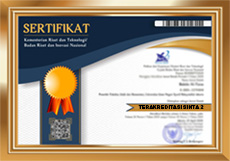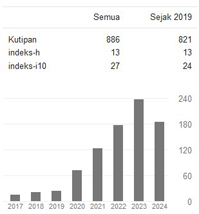NARASI RADIKALISME DAN KETAKUTAN | RADICALISM NARRATION AND FEAR
Abstract
Indonesian history has been filled with many radical ideas and movements aiming to bring about radical changes in the direction of the nation state. Yet radicalism has created fear and angst amongst communities. This paper examines the narrative of radicalism and fear as constructed in an Indonesian Catholic document published in 1967. The document narrates the historical and political events from Indonesia’s independence to the early years of Suharto’s New Order regime, with a particular focus on the Madiun incident of 1948 and the Crocodile Hole tragedy of 1965. The paper argues that the document scrutinized is nothing but a fear text, and the fear narrative as constructed in the text is related to radicalism – namely the leftist radicalism represented by the Indonesian communists pre-1965, and the rightist radicalism represented by religious (Muslim) radicals post-1965. This main argument is explained with reference to Martin Heidegger’s philosophy of fear, and it concludes that the fear experiences concerning the communist past is paralelled with the experiences of fear in recent times in relation to religious (Islamic) radicalism.
Keywords: radicalism, fear, communists, Muslims, Catholics, Heidegger
Abstrak:
Sejarah Indonesia dililiti banyak ide dan gerakan radikal yang bertujuan untuk membawa perubahan radikal ke arah negara bangsa. Namun radikalisme telah menciptakan ketakutan dan kecemasan di antara masyarakat. Makalah ini mengkaji narasi radikalisme dan ketakutan yang dibangun dalam dokumen Katolik Indonesia yang diterbitkan pada tahun 1967. Dokumen tersebut menceritakan peristiwa sejarah dan politik dari kemerdekaan Indonesia hingga tahun-tahun awal rezim Orde Baru Suharto, dengan fokus khusus pada insiden Madiun dari 1948 dan tragedi Lubang Buaya 1965. Makalah ini berpendapat bahwa dokumen yang diteliti tidak lain adalah teks ketakutan, dan narasi rasa takut yang terkonstruksi dalam teks ini terkait dengan radikalisme - yaitu radikalisme kiri yang diwakili oleh komunis Indonesia pra-1965, dan radikalisme kanan yang diwakili oleh radikal agama (Muslim) pasca-1965. Argumen utama ini dijelaskan dengan mengacu pada filosofi rasa takut Martin Heidegger, dan disimpulkan pengalaman-pengalaman ketakutan mengenai masa lalu komunis dilumpuhkan dengan pengalaman-pengalaman ketakutan belakangan ini dalam kaitannya dengan radikalisme agama (Islam).
Kata-kata Kunci: radikalisme, ketakutan, komunis, Muslim, Katolik, Heidegger
Full Text:
PDFReferences
........... (Tak dispesifikasi). Dari Madiun ke Lubang Buaja, Dari Lubang Buaja ke …?. Jakarta: Sekretariat Nasional K.M. Gunung Sahari 88, 1967.
Badri, Jusuf. Inilah Komunisme dan “Agama” Komunis. Jakarta: Penerbit
Restu Agung, 1997.
Clifford, James and George E. Marcus. Writing Culture: The Poetics and
Politics of Ethnography. Berkeley, Los Angeles, London: University of California Press, 1986.
Cribb, Robert. The Indonesian Killings 1965-1966 Studies from Java and Bali.
Clayton: Centre of Southeast Asian Studies, Monash University, 1990.
-----------.. “Unresolved Problems in the Indonesian Killings of 1965-66.” Dalam
Asian Survey. Vol 42, No. 4 (July/August 2002), pp. 550-563.
-----------. “The Indonesian Massacres.”Dalam From Century of Genocide. 3rd
Edition. Melbourne: Taylor and Francis, Inc., 2009.
Cribb, Robert dan Ford, Michele. “The Killings of 1965-66.”. Inside Indonesia.
No. 99 (Jan-Mar 2010).
Feith, Herbert. 1957. “The Indonesian Elections of 1955”. Interim Reports Series
– Modern Indonesia Project. Ithaca, New York: Southeast Asia Program, Department of Far Eastern Studies, Cornell University.
------------. 1962. The Decline of Constitutional Democracy in Indonesia. Ithaca, New
York: Cornell University Press.
-------------. 1963. “Dynamics of Guided Democracy”. In Ruth T. McVey, ed.
Indonesia. New Haven, Conn., United Printing Services, Inc.
-------------. 1964. “President Soekarno, the Army and the Communists: The Triangle
Changes Shape.” Dalam Asia Survey. Vol. 4, No. 8 (Aug., 1964), 969-980.
Heidegger, Martin. Being and Time. Trans. John Macquarrie &
Edward Robinson. Oxford UK & Cambridge USA: Blackwell, 1963 [1978].
Heintz, Christophe. “Ethnographic Cognition and Writing Culture.” Dalam Olaf
Zenker and Karsten Kumoll (eds.). Beyond Writing Culture: Current Intersections of Epistemologies and Practices of Representation. Oxford, UK: Berghahn Books, 2008.
Heryanto, Ariel. State Terrorism and Political Identity in Indonesia: Fatally
Belonging. London and New York: Routledge, 2006.
Mintz, Jeanne S. Muhammad, Marx, Marhaen: Akar Sosialisme Indonesia.
Yogyakarta: Pustaka Pelajar Offset, 2002.
Ricklefs, M.C. A history of modern Indonesia since c. 1200. Stanford: Stanford
University Press, 1991.
Romly, A.M. (Cetakakan pertama). Agama Menentang Komunisme. Jakarta:
PT. Bina Rena Pariwara (BRP), 1997.
Solahudin. “How Dangerous are Indonesian ISIS and Deportees?” Dalam Public
Lecture. Melbourne: The University of Melbourne, 6 Maret 2018.
Tillich, Paul. The Courage to Be. CT: Yale University Press, 1952.
---------------. Dynamics of Faith. New York: Harper & Row Publishers, 1957.
Wejak, Justin L. “Ketakutan 1965 sebagai Ketakutan Masa Kini: Menelaah Ketakutan Sekuler, Agama dan Supranatural”. Dalam Madung, Otto Gusti dan Mansford, John Prior. (eds.) Berani Berhenti Berbohong. Ledalero: Penerbit Ledalero & Litbang STFK Ledalero, 2015.
-------------. “Ketakutan 1965 sebagai Ketakutan Masa Kini: Menelaah Ketakutan
Sekuler, Agama dan Supranatural”. Jurnal Ledalero. Vol. 14, No.1 (June
, pp. 83-108.
-------------. 2017. “Secular, Religious and Supernatural: An Eastern Indonesian
Catholic Experience of Fear (Autoethnographic Reflections on the Reading of
a New Order-Era Propaganda Text)”. PhD Thesis. Melbourne: The
University of Melbourne.
DOI: http://dx.doi.org/10.31385/jl.v17i1.128.77-94
Refbacks
- There are currently no refbacks.

Copyright© 2015 JURNAL LEDALERO This work is licensed under a Creative Commons Attribution-NonCommercial-ShareAlike 4.0 International License.
Institut Filsafat dan Teknologi Kreatif Ledalero Jalan Trans Maumere-Ende - Sikka - Flores - Nusa Tenggara Timur - Indonesia Telp/Fax: 0382 2426535










